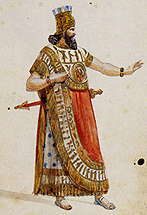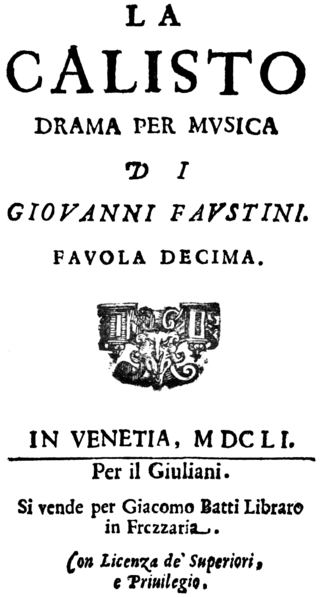
Don Giovanni is an opera in two acts with music by Wolfgang Amadeus Mozart to an Italian libretto by Lorenzo Da Ponte. Its subject is a centuries-old Spanish legend about a libertine as told by playwright Tirso de Molina in his 1630 play El burlador de Sevilla y convidado de piedra. It is a dramma giocoso blending comedy, melodrama and supernatural elements. It was premiered by the Prague Italian opera at the National Theatre, now called the Estates Theatre, on 29 October 1787. Don Giovanni is regarded as one of the greatest operas of all time, and has proved a fruitful subject for commentary in its own right; critic Fiona Maddocks has described it as one of Mozart's "trio of masterpieces with librettos by Da Ponte".

Francesco Cavalli was a Venetian composer, organist and singer of the early Baroque period. He succeeded his teacher Claudio Monteverdi as the dominant and leading opera composer of the mid 17th-century. A central figure of Venetian musical life, Cavalli wrote more than thirty operas, almost all of which premiered in the city's theaters. His best known works include Ormindo (1644), Giasone (1649) and La Calisto (1651).

La gazza ladra is a melodramma or opera semiseria in two acts by Gioachino Rossini, with a libretto by Giovanni Gherardini based on La pie voleuse by Théodore Baudouin d'Aubigny and Louis-Charles Caigniez. The Thieving Magpie is best known for the overture, which is musically notable for its use of snare drums. This memorable section in Rossini's overture evokes the image of the opera's main subject: a devilishly clever, thieving magpie.

Nabucco is an Italian-language opera in four acts composed in 1841 by Giuseppe Verdi to an Italian libretto by Temistocle Solera. The libretto is based on the biblical books of 2 Kings, Jeremiah, Lamentations, and Daniel, and on the 1836 play by Auguste Anicet-Bourgeois and Francis Cornu. However, Antonio Cortese's ballet adaptation of the play, given at La Scala in 1836, was a more important source for Solera than the play itself. Under its original name of Nabucodonosor, the opera was first performed at La Scala in Milan on 9 March 1842.

Grand opera is a genre of 19th-century opera generally in four or five acts, characterized by large-scale casts and orchestras. The original productions consisted of spectacular design and stage effects with plots normally based on or around dramatic historic events. The term is particularly applied to certain productions of the Paris Opéra from the late 1820s to around 1860; 'grand opéra' has sometimes been used to denote the Paris Opéra itself.

Italian opera is both the art of opera in Italy and opera in the Italian language. Opera was in Italy around the year 1600 and Italian opera has continued to play a dominant role in the history of the form until the present day. Many famous operas in Italian were written by foreign composers, including Handel, Gluck and Mozart. Works by native Italian composers of the 19th and early 20th centuries, such as Rossini, Bellini, Donizetti, Verdi and Puccini, are amongst the most famous operas ever written and today are performed in opera houses across the world.

I Lombardi alla Prima Crociata is an operatic dramma lirico in four acts by Giuseppe Verdi to an Italian libretto by Temistocle Solera, based on an epic poem by Tommaso Grossi, which was "very much a child of its age; a grand historical novel with a patriotic slant". Its first performance was given at the Teatro alla Scala in Milan on 11 February 1843. Verdi dedicated the score to Maria Luigia, the Habsburg Duchess of Parma, who died a few weeks after the premiere. In 1847, the opera was significantly revised to become Verdi's first grand opera for performances in France at the Salle Le Peletier of the Paris Opera under the title of Jérusalem.

Attila is an opera in a prologue and three acts by Giuseppe Verdi to an Italian libretto by Temistocle Solera, based on the 1809 play Attila, König der Hunnen by Zacharias Werner. The opera received its first performance at La Fenice in Venice on 17 March 1846.

L'Ormindo is an opera in a prologue and three acts by Francesco Cavalli to an original Italian libretto by Giovanni Faustini. The manuscript score is held at the Biblioteca Marciana in Venice, while a copy of the original libretto has been digitized by the Library of Congress. The opera has set numbers with recitative, and is set in Anfa (Casablanca), in the Mauri kingdom of Fessa (Fez).
Dame Jane Alison Glover is a British conductor and musicologist.

Jérusalem is a grand opera in four acts by Giuseppe Verdi. The libretto was to be an adaptation and partial translation of the composer's original 1843 Italian opera, I Lombardi alla prima crociata. It was the one opera which he regarded as the most suitable for being translated into French and, taking Eugène Scribe's advice, Verdi agreed that a French libretto was to be prepared by Alphonse Royer and Gustave Vaëz, who had written the libretto for Donizetti's most successful French opera, La favorite. The opera received its premiere performance at the Salle Le Peletier in Paris on 26 November 1847. The maiden production was designed by Paul Lormier (costumes), Charles Séchan, Jules Diéterle and Édouard Desplechin, and Charles-Antoine Cambon and Joseph Thierry.

La Calisto is an Italian opera by Francesco Cavalli from a libretto by Giovanni Faustini based on the mythological story of Callisto.

Prima la musica e poi le parole is an opera in one act by Antonio Salieri to a libretto by Giovanni Battista Casti. The work was first performed on 7 February 1786 in Vienna, following a commission by the Emperor Joseph II. The opera was first performed at one end of the orangery of the Schönbrunn Palace in Vienna by an Italian troupe; on the same occasion, Mozart's Der Schauspieldirektor was staged at the other end.

La scuola de' gelosi is a dramma giocoso in two acts by Antonio Salieri, set to a libretto by Caterino Mazzolà.

La fiera di Venezia is a three-act opera buffa, described as a commedia per musica, by Antonio Salieri, set to an Italian libretto by Giovanni Gastone Boccherini.

Erismena is an opera in a prologue and three acts by Francesco Cavalli. First performed in Venice in 1655, it was designated as a dramma per musica.

L'Egisto (Aegisthus) is a 1643 opera in a prologue and three acts by Francesco Cavalli. It was designated as a favola dramatica musicale. The Italian libretto was by Giovanni Faustini, his second text for Cavalli.
Giovanni Faustini was an Italian librettist and opera impresario of the 17th century. He is best remembered for his collaborations with the composer Francesco Cavalli.

Artemisia is an opera in three acts and a prologue by the Italian composer Francesco Cavalli from a libretto written by Nicolò Minato. It was first performed at the Teatro San Giovanni e San Paolo, Venice on 10 January 1657 and revived in Naples in 1658, Palermo in 1659, Milan in 1663 and Genoa in 1665.
Il pesceballo is a 19th-century American pasticcio opera in one act featuring the music of Bellini, Donizetti, Mozart, and Rossini, with a spoof Italian libretto by Francis James Child which makes use of some of grand opera's most popular melodies. The recitatives and chorus parts were written by John Knowles Paine, and James Russell Lowell translated the libretto into English.












